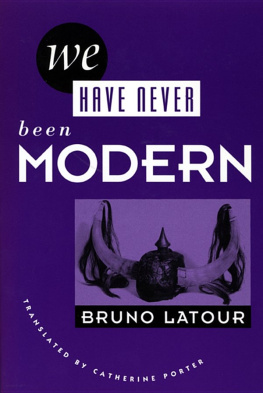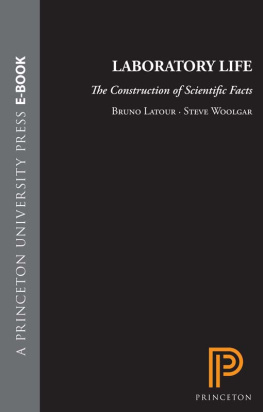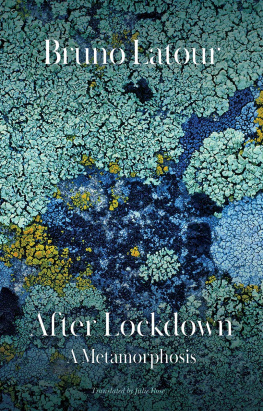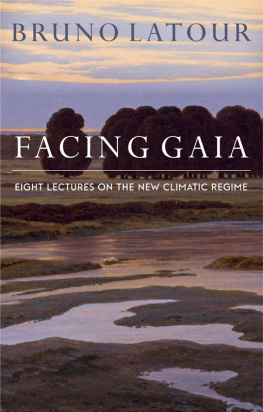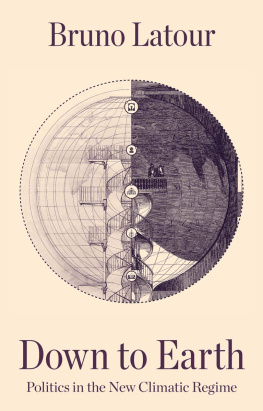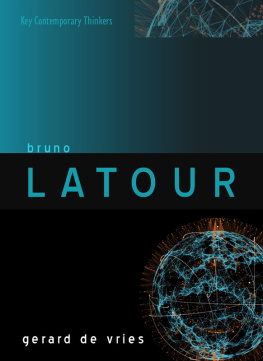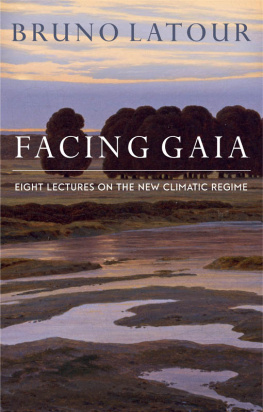Bruno Latour - We Have Never Been Modern
Here you can read online Bruno Latour - We Have Never Been Modern full text of the book (entire story) in english for free. Download pdf and epub, get meaning, cover and reviews about this ebook. year: 1993, publisher: Harvard University Press, genre: Politics. Description of the work, (preface) as well as reviews are available. Best literature library LitArk.com created for fans of good reading and offers a wide selection of genres:
Romance novel
Science fiction
Adventure
Detective
Science
History
Home and family
Prose
Art
Politics
Computer
Non-fiction
Religion
Business
Children
Humor
Choose a favorite category and find really read worthwhile books. Enjoy immersion in the world of imagination, feel the emotions of the characters or learn something new for yourself, make an fascinating discovery.
- Book:We Have Never Been Modern
- Author:
- Publisher:Harvard University Press
- Genre:
- Year:1993
- Rating:4 / 5
- Favourites:Add to favourites
- Your mark:
- 80
- 1
- 2
- 3
- 4
- 5
We Have Never Been Modern: summary, description and annotation
We offer to read an annotation, description, summary or preface (depends on what the author of the book "We Have Never Been Modern" wrote himself). If you haven't found the necessary information about the book — write in the comments, we will try to find it.
We Have Never Been Modern — read online for free the complete book (whole text) full work
Below is the text of the book, divided by pages. System saving the place of the last page read, allows you to conveniently read the book "We Have Never Been Modern" online for free, without having to search again every time where you left off. Put a bookmark, and you can go to the page where you finished reading at any time.
Font size:
Interval:
Bookmark:
We Have Never Been Modern
We Have Never Been Modern
Bruno Latour
translated by Catherine Porter
Harvard University Press
Cambridge, Massachusetts
This translation 1993 by Harvester Wheatsheaf and the President and Fellows of Harvard College
All rights reserved
Originally published as Nous navons jamais t modernes: Essais danthropologie symmtrique.
Copyright 1991 La Dcouverte
Library of Congress Cataloging-in-Publication Data
Latour, Bruno.
[Nous navons jamais t modernes. English]
We have never been modern / Bruno Latour : translated by Catherine Porter.
p. cm.
Translation of: Nous navons jamais t moderns.
Includes bibliographical references and index.
ISBN 0674948386. ISBN 0674948394 (pbk.)
1. Science-Social aspects. 2. Technology-Social aspects. 3. Science-Philosophy. 4. Science-History. I. Title.
Q175.5.L3513 1993
303.483-dc20
9315226
CIP
For Charis and Adrian
CONTENTS
In many places the English text differs from the French. I have modified the figures, added and qualified or clarified the argument without modifying its main structure. I have abstained from giving empirical examples in order to retain the speculative and, I am afraid, very Gallic! character of this essay. Many case studies, including several by myself, will be found in the bibliography. Having written several empirical books, I am trying here to bring the emerging field of science studies to the attention of the literate public through the philosophy associated with this domain.
Many people have tried to make this essay less unreasonable. Among them I especially thank Luc Boltanski, Francis Chateauraynaud, Elizabeth Claverie, Gerard de Vries, Franois Gze and Isabelle Stengers.
I thank Harry Collins, Ernan McMullin, Jim Griesemer, Michel Izard, Clifford Geertz and Peter Galison for allowing me to present the arguments of this essay in their seminars.
Parts of have appeared in a different form in One more turn after the social turn: easing science studies into the non-modern world, in E. McMullin, ed., The Social Dimensions of Science. Notre Dame: Notre Dame University Press, 1992, pp. 27292.
On page four of my daily newspaper, I learn that the measurements taken above the Antarctic are not good this year: the hole in the ozone layer is growing ominously larger. Reading on, I turn from upper-atmosphere chemists to Chief Executive Officers of Atochem and Monsanto, companies that are modifying their assembly lines in order to replace the innocent chlorofluorocarbons, accused of crimes against the ecosphere. A few paragraphs later, I come across heads of state of major industrialized countries who are getting involved with chemistry, refrigerators, aerosols and inert gases. But at the end of the article, I discover that the meteorologists dont agree with the chemists; theyre talking about cyclical fluctuations unrelated to human activity. So now the industrialists dont know what to do. The heads of state are also holding back. Should we wait? Is it already too late? Toward the bottom of the page, Third World countries and ecologists add their grain of salt and talk about international treaties, moratoriums, the rights of future generations, and the right to development.
The same article mixes together chemical reactions and political reactions. A single thread links the most esoteric sciences and the most sordid politics, the most distant sky and some factory in the Lyon suburbs, dangers on a global scale and the impending local elections or the next board meeting. The horizons, the stakes, the time frames, the actors none of these is commensurable, yet there they are, caught up in the same story.
On page six, I learn that the Paris AIDS virus contaminated the culture medium in Professor Gallos laboratory; that Mr Chirac and Mr Reagan had, however, solemnly sworn not to go back over the history of that discovery; that the chemical industry is not moving fast enough to market medications which militant patient organizations are vocally demanding; that the epidemic is spreading in sub-Saharan Africa. Once again, heads of state, chemists, biologists, desperate patients and industrialists find themselves caught up in a single uncertain story mixing biology and society.
On page eight, there is a story about computers and chips controlled by the Japanese; on page nine, about the right to keep frozen embryos; on page ten, about a forest burning, its columns of smoke carrying off rare species that some naturalists would like to protect; on page eleven, there are whales wearing collars fitted with radio tracking devices; also on page eleven, there is a slag heap in northern France, a symbol of the exploitation of workers, that has just been classified as an ecological preserve because of the rare flora it has been fostering! On page twelve, the Pope, French bishops, Monsanto, the Fallopian tubes, and Texas fundamentalists gather in a strange cohort around a single contraceptive. On page fourteen, the number of lines on high-definition television bring together Mr Delors, Thomson, the EEC, commissions on standardization, the Japanese again, and television film producers. Change the screen standard by a few lines, and billions of francs, millions of television sets, thousands of hours of film, hundreds of engineers and dozens of CEOs go down the drain.
Fortunately, the paper includes a few restful pages that deal purely with politics (a meeting of the Radical Party), and there is also the literary supplement in which novelists delight in the adventures of a few narcissistic egos (I love you... you dont). We would be dizzy without these soothing features. For the others are multiplying, those hybrid articles that sketch out imbroglios of science, politics, economy, law, religion, technology, fiction. If reading the daily paper is modern mans form of prayer, then it is a very strange man indeed who is doing the praying today while reading about these mixed-up affairs. All of culture and all of nature get churned up again every day.
Yet no one seems to find this troubling. Headings like Economy, Politics, Science, Books, Culture, Religion and Local Events remain in place as if there were nothing odd going on. The smallest AIDS virus takes you from sex to the unconscious, then to Africa, tissue cultures, DNA and San Francisco, but the analysts, thinkers, journalists and decision-makers will slice the delicate network traced by the virus for you into tidy compartments where you will find only science, only economy, only social phenomena, only local news, only sentiment, only sex. Press the most innocent aerosol button and youll be heading for the Antarctic, and from there to the University of California at Irvine, the mountain ranges of Lyon, the chemistry of inert gases, and then maybe to the United Nations, but this fragile thread will be broken into as many segments as there are pure disciplines. By all means, they seem to say, let us not mix up knowledge, interest, justice and power. Let us not mix up heaven and earth, the global stage and the local scene, the human and the nonhuman. But these imbroglios do the mixing, youll say, they weave our world together! Act as if they didnt exist, the analysts reply. They have cut the Gordian knot with a well-honed sword. The shaft is broken: on the left, they have put knowledge of things; on the right, power and human politics.
For twenty years or so, my friends and I have been studying these strange situations that the intellectual culture in which we live does not know how to categorize. For lack of better terms, we call ourselves sociologists, historians, economists, political scientists, philosophers or anthropologists. But to these venerable disciplinary labels we always add a qualifier: of science and technology. Science studies, as Anglo-Americans call it, or science, technology and society. Whatever label we use, we are always attempting to retie the Gordian knot by crisscrossing, as often as we have to, the divide that separates exact knowledge and the exercise of power let us say nature and culture. Hybrids ourselves, installed lopsidedly within scientific institutions, half engineers and half philosophers, tiers instruits (Serres, 1991) without having sought the role, we have chosen to follow the imbroglios wherever they take us. To shuttle back and forth, we rely on the notion of translation, or network. More supple than the notion of system, more historical than the notion of structure, more empirical than the notion of complexity, the idea of network is the Ariadnes thread of these interwoven stories.
Next pageFont size:
Interval:
Bookmark:
Similar books «We Have Never Been Modern»
Look at similar books to We Have Never Been Modern. We have selected literature similar in name and meaning in the hope of providing readers with more options to find new, interesting, not yet read works.
Discussion, reviews of the book We Have Never Been Modern and just readers' own opinions. Leave your comments, write what you think about the work, its meaning or the main characters. Specify what exactly you liked and what you didn't like, and why you think so.

